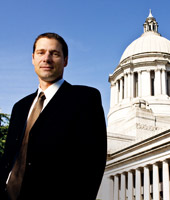Counseling Reform
Faculty member helps raise Washington’s standards for registered counselors

When Scott Edwards accepted Govenor Christine Gregoire’s invitation to serve on a counseling reform task force, Washington was one of only two states in the nation to give untrained counselors a state-sanctioned title. |
Before Seattle Pacific University Associate Professor of Marriage and Family Therapy Scott Edwards and his colleagues rolled up their sleeves, anyone taking a four-hour AIDS-awareness course and paying a $40 fee could become a registered counselor in Washington state. The state’s lax registered counselor (RC) credential allowed individuals without any minimum level of training, education, or supervision to counsel vulnerable clients. In addition, consumers were easily confused between registered counselors and licensed counselors, both of whom could legally provide counseling in private-practice settings.
Edwards, who directs internships in the graduate marriage and family therapy program of SPU’s School of Psychology, Family, and Community, was appointed last year by Governor Christine Gregoire to a task force to fix the problem. Its assignment was to tighten the credentialing requirements for 18,500 registered counselors in practice areas such as marriage and family therapy, social work, mental health counseling, hypnotherapy, and chemical dependency. Of the registered counselors, half had master’s degrees and were working toward licensure. The rest did not have graduate degrees, and 10 percent did not have college or, in some cases, high school diplomas.
On March 25, 2008, the Seattle Pacific faculty member and other proponents stood with the governor as she signed into law “Counselor Credentialing Standards” that instituted stricter certification and licensing requirements and by 2010 will abolish the old system altogether. New titles will clearly describe the training and services of providers.
It was a satisfying victory, says Edwards: “Legislatively speaking, this went through quickly. But it took a lot of energy.”
As part of the volunteer effort, he traveled often to the state capital of Olympia and testified frequently before the State House of Representatives and the State Senate. When investigators with KING-TV in Seattle broke the story, Edwards became an on-air spokesman for the reform effort.
At the same time, he was hard at work being a new husband and new dad. His wife, Cher Edwards, is chair of the De-partment of Counselor Education in the School of Education at SPU. They have a 3-year-old son.
“It all comes down to calling,” says Scott Edwards. “As I tell my students, ‘It’s not about you.’ We have a bigger pur-pose in serving Christ. When working in this profession, as in most professions, we can get tunnel vision. I need to ask, ‘What’s the larger picture?’”
Marriage and family therapy is one of five core mental health professions recognized by the National Institutes of Health. Edwards has served the American Association for Marriage and Family Therapy (AAMFT) and, after 13 years of state positions, he was elected to its national board. He serves as chair of the AAMFT Council of Divisional Presidents.
To people in Washington state who received counseling without a clear assurance of the qualifications of their provider, he represents the hope that those days are over.
—By Clint Kelly (ckelly@spu.edu)
—Photo by Luke Rutan
Exclusive: Related Response Video
Associate Professor of Marriage and Family Therapy Scott Edwards explains why the "Counselor Credentialing Standards" are so important for Washington citizens.
Return to top
Back to Campus Home
|